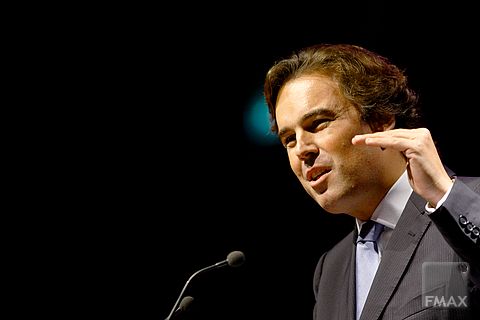The great and the good assembled in the Aula this week to officially open TU Delft’s new academic year. Unlimited ambition was theme of the day, with Minister Camiel Eurlings, of the Dutch Ministry of Transport, Public Works and Water Management, delivering an impassioned plea for more entrepreneurship.
The minister was however late for his speaking engagement, but of course this wasn’t because he was stuck in traffic. “I’m the only person in the Netherlands who can’t use that as an excuse,” the minister joked. Rather, the minister was late because he had spent too much time admiring the DUT Racing Team cart parked in the Aula’s lobby.
After delivering a paean to this super fuel-efficient cart, which won first prize for best design at the international Formula Zero competition held at the Silverstone (UK) racetrack last July, Minister Eurlings called for greater courage and entrepreneurial drive.
The opening of this year’s academic year was apparently the place to be, as the Aula was overflowing, with many people turned away at the door in accordance with fire regulations pertaining to overcrowding. Although he didn’t mention the Dutch East India Company specifically by name, the minister’s speech clearly harked back to the glory days of Dutch international trade: “The Netherlands must be courageous, innovative, embrace the world economy and be leading traders like in the 17th century.”
His message was welcomed by the students in attendance, not least of all because he stressed that the Dutch economy will need more engineers in the year’s ahead: “Netherlands Inc. expects a lot from you. I’m proud of the way TU Delft is helping to build our future.”
The president of TU Delft, Dirk Jan van den Berg, praised TU Delft’s 17th place ranking in the Times Higher Education Supplement’s list of Top 100 universities of technology in the world. But Van den Berg warned that TU Delft will face increasing competition for other international universities: “China is investing massively in education and R&D, as are other European countries. The Netherlands however invests less that the EU average.” To maintain its international standing, TU Delft must engage in more international partnerships with research institutes and companies around the world, Van den Berg said.
Van den Berg also warned that the TU faces challenges associated with the sharp rise in student numbers. “Student enrollment this year rose by 23 to 24 percent compared to last year, yet university funding has not increased.”
Nadat besloten was dat de presentatie tijdens de Olympische spelen in Beijing niet doorging, is de ontwikkeling van het voertuig gesplitst, vertelt Melkert. De techniek voor besturing, hydraulica, pneumatiek en aandrijving is op een metalen platform gemonteerd (de ‘mule’) om een en ander werkend te krijgen.
Op de RDW testbaan nabij Lelystad zijn met het platform snelheden van meer dan 100 kilometer per uur bereikt. Uiteindelijk moet de bus meer dan dubbel zo snel gaan rijden.
Het chassis, en daarmee de carrosserie, is apart verder ontwikkeld. Volgens Melkert is het koetswerk nu klaar voor het trekken van de kabels. Daarna zal de techniek overgezet worden van het platform in de carrosserie.
Wat dan rest is het aanbrengen van de deuren, het sluiten van de carrosserie, het schuren, polijsten en spuiten.
Melkert waagt zich niet aan het noemen van een datum voor de presentatie.
Aanstaande dinsdag geeft Melkert een presentatie over de superbus in restaurant Engels in Rotterdam. De bijeenkomst wordt georganiseerd door ingenieursvereniging KiviNiria en de entree kost 25 euro.
Meer info op www.kiviniria.net

<![CDATA[
]]>The minister was however
late for his speaking engagement, but of course this wasn’t because he was
stuck in traffic. “I’m the only person in the Netherlands who can’t use that as
an excuse,” the minister joked.
Rather, the minister was late because he had
spent too much time admiring the bioethanol car of the DUT Formula Student
Racing Team and the cart of the Greenchoice Forze, the student hydrogen racing
team of the TU Delft, both parked in the Aula’s lobby. After
delivering a paean to these super fuel-efficient cars, Minister Eurlings called
for greater courage and entrepreneurial drive.
The opening of this year’s academic year was apparently the place to be, as the Aula was overflowing, with many people turned away at the door in accordance with fire regulations pertaining to overcrowding. Although he didn’t mention the Dutch East India Company specifically by name, the minister’s speech clearly harked back to the glory days of Dutch international trade: “The Netherlands must be courageous, innovative, embrace the world economy and be leading traders like in the 17th century.”
His message was welcomed by the students in attendance, not least of all because he stressed that the Dutch economy will need more engineers in the year’s ahead: “Netherlands Inc. expects a lot from you. I’m proud of the way TU Delft is helping to build our future.”
The president of TU Delft, Dirk Jan van den Berg, praised TU Delft’s 17th place ranking in the Times Higher Education Supplement’s list of Top 100 universities of technology in the world. But Van den Berg warned that TU Delft will face increasing competition for other international universities: “China is investing massively in education and R&D, as are other European countries. The Netherlands however invests less that the EU average.” To maintain its international standing, TU Delft must engage in more international partnerships with research institutes and companies around the world, Van den Berg said.
Van den Berg also warned that the TU faces challenges associated with the sharp rise in student numbers. “Student enrollment this year rose by 23 to 24 percent compared to last year, yet university funding has not increased.”


Comments are closed.